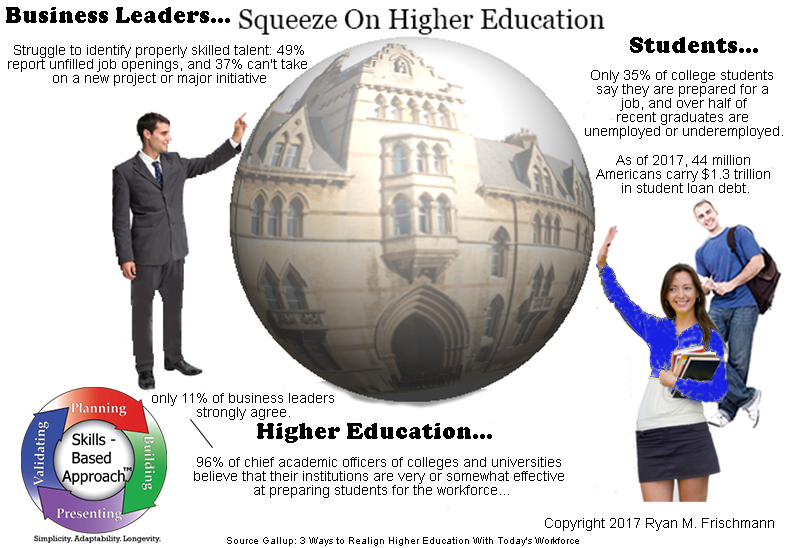Three years ago, I wrote a piece on the disconnect between companies and higher education, which I called the ‘Squeeze on Higher Education’. Not much has changed in the intervening years. This week I read an updated article from Gallup, where the numbers were the same or (worse?).
The de facto college degree is getting squeezed from two directions: employers requiring professionals to build new-age technical skills (where there is currently a skills gap); and typical students who are faced with the rising cost of a traditional college degree and must take on significant debt.
Everything is fine according to higher education leaders. Ninety-six percent of chief academic officers of colleges and universities “believe that their institutions are very or somewhat effective at preparing students for the workforce”, but only 11% of business leaders “strongly agree” according to Gallup’s article 3 Ways to Realign Higher Education With Today's Workforce.
(In my previous article, I referenced a pair of Gallup Polls in 2014.) In one of them, a very strong majority of business leaders say hiring managers consider ‘knowledge’ and ‘applied skills’ as ‘very important in hiring decisions’ – 84 and 79 percent respectively. (This is far greater than the ‘degree’ or ‘college attended’ in the same category, only 28 and 9 percent respectively.). In the other, business leaders were asked if higher education graduates have the skills ‘my business needs’ and 33 percent disagreed and 34 percent were neutral to the statement.
From the students’ perspective, there is pressure. In 2017, student debt for 44 million Americans is around 1.3 trillion (same article). Yet, many graduate ill prepared to start making contributions at a company.
I think the problem is not stressing enough importance on applied, skills based learning and not effective planning to have the skills needed for a career. I also think alternative forms of education are optimal for specific careers. Many technical careers work best with a combination of classroom and experiential learning. This seems to suggest a ‘new age’ apprenticeship and /or mentorship model. (As I have always said, many higher education institutions will adapt and offer these new programs.)
Skills Based Approach is an effective platform to plan, track, and assess skills as students navigate into the career roles. It is ideal because of its: adaptability to work with all forms of education; and longevity, in the sense it suggests continuity (in planning and building of skills) through education, higher education, and early career development
Skills Culture is a growth mindset where students are motivated and take action to learn and apply skills. Practitioners (professors and business leaders) work to identify and communicate the demand for skills in their organizations. Working together, all parties use the mindset to address the communication disconnect between them and have a basis to move forward.
